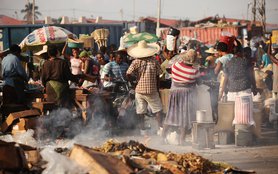Updated January 2014
For many Haitians who live on less than $2 a day, disaster has deepened their poverty. A massive earthquake in 2010 was followed by the introduction of cholera, a deadly waterborne disease that continues to flare in the island nation. After responding to both emergencies, Oxfam is now working with local partners to reinvigorate the agriculture-based economy of the Artibonite Valley.
Supporting farmers
In partnership with local community-based organizations and Ministry of Agriculture offices, Oxfam is working with farmers in the Artibonite Valley to increase their rice production, diversify their sources of income, especially through livestock production, and improve their food security—all to provide more and better opportunities for the rural population. The multifaceted program includes helping to establish an early warning system on food insecurity and climate hazards, improving the management of irrigation systems, combating pests and rodents that contribute to crop losses, working with farmers to diversify their crops, and improving the production, processing, and marketing of rice.
Advocating with the government
In partnership with civil society organizations, we are also advocating with the government and other national and international stakeholders for agricultural and trade policies that support rather than undermine the country's farmers.
Reducing the risk of disaster
These longer-term development activities work in concert with our humanitarian efforts. Oxfam has continued to help Haitians reduce the risk of disaster by strengthening local and communal civil protection committees in the Artibonite Valley, creating an emergency local response team in which women are integrated, supporting the development of contingency plans at the communal and family levels, building healthy wells, and conducting cholera education and hygiene promotion in schools and at-risk communities.




















Spread the word
Help us build a global movement for change.